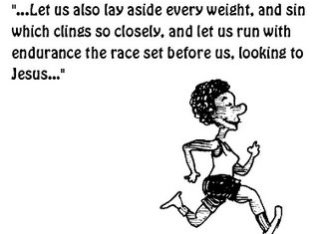Here are a few thoughts from my recent reading of Genesis 3.
Concerning the Fall
Gen. 3 teaches us, through the story of the Fall, the deceitfulness and seriousness of sin. Satan’s main deception was to point out that God’s law was unreasonable, and that there was something better to be obtained (pleasure, wisdom, a God-like status) by breaking it. The application I want to draw from this relates to the fact that our own temptations to sin, are temptations to think ill of God or to distrust God, because we are tempted to believe that God’s law against the action or attitude we seek to do or have prevents us from something better which we could enjoy. For us, it is not a tree or some fruit which is “a delight to the eyes“, or that is “desired to make one wise“. Rather it is selfishness, lust, self-pity, laziness, covetousness, anger, ill-will to others, or pride (and many more) which seems so delightful and desirable. It is our pride or self-interest which causes us to accept these pleasures of sin, instead of God’s best for us through obedience. So our succombing to the lie of temptation and knowingly following on into sin is a slap in God’s face. We set ourselves up to know what is best for us. God does not give us laws to gain sinful glee over our misery, he does so for our good.
Think about it, Adam and Eve had the prospect of an eternity without pain, disease, and strife in a perfect paradise with the highest possible communion with God Himself. And they threw it away for some temporary pleasure. Ask yourself what you are giving up, the next time temptation knocks on your door.
Along these lines we need to be reminded of the seriousness of sin. Heb. 3:12-14 teaches that through the deceitfulness of sin our hearts can be hardened to the point of falling away permanently from God by not holding our original confidence firm to the end. Heb. 12:14 speaks of a “holiness without which no one will see the Lord.” So sin is serious! Jesus, speaking of lust said, “If your right eye causes you to sin, tear it out and throw it away. For it is better that you lose one of your members than that your whole body be thrown into hell.” (Matt. 5:29) In other words, we need to have a “kill or be (eternally) killed” attitude with sin. John Owen, commenting on Rom. 8:13 said, “…always be killing sin, or it will be killing you.” (pg. 5 of The Mortification of Sin by John Owen [abridged by Richard Rushing], Banner of Truth: Edinburgh, 2004) He also said, “Sin is always acting, always conceiving, and always seducing and tempting….If sin is always acting, we are in trouble if we are not always mortifying.” (pg. 7)
No, I am not advocating the view that we obtain our salvation by works. This is impossible to do, and an unscriptual position to hold (see Rom. 3:28, Rom. 4:1-8; Eph. 2:8-9, Titus 3:5). But Martin Luther speaks the conclusion of all the Reformers when he says, “Justification is by faith alone, but not by the faith that is alone.” In other words, true saving faith is not present without true Spirit-wrought works. Thus, concerning false prophets (obviously ones with a false profession) Jesus says, “You will recognize them by their fruits….” (Matt. 7:16). This is why Abraham is said to be both not “justified by works” (the argument from Rom. 4:1-5), and “justified by works” (James 2:20-26). The justification spoke of in James 2 (“You see that a person is justified by works and not by faith alone” vs. 24) is a vindication of God’s pronouncement that faith is to be “counted…as righteousness” (for Abraham and for all who follow his faith, Rom. 4:22-25). In other words, good works prove that one has been regenerated and saved by faith. Eph. 2:8-10 teach that we are not saved by our good works, but we are saved to be doing good works. The good works stem from a Spirit-wrought sanctification that Christ ordains for all who are his people by faith (see Titus 2:14). This is why John makes such sweeping statements in 1 John such as “Whoever practices righteousness is righteous, as he is righteous. Whoever makes a practice of sinning is of the devil, for the devil has been sinning from the beginning.” (3:7b-8a) And again, “No one born of God makes a practice of sinning, for God’s seed abides in him, and he cannot keep on sinning because he has been born of God.” (3:9)
Our works prove the genuineness of our faith. It is possible to be self-deceived concerning our faith (Matt. 7:21-23, and 2 Cor. 13:5). We are warned that we could have “believed in vain” (1 Cor. 15:2). So going back to my main point, we must remember the seriousness of sin. Gal. 6:7-8 reminds us, “Do not be deceived: God is not mocked, for whatever one sows, that will he also reap. For the one who sows to his own flesh will from the flesh reap corruption, but the one who sows to the Spirit will from the Spirit reap eternal life.”
I do not want to major only on what we might reap by developing a “practice of sinning“. Also consider the glory of what we miss here and now. We miss God’s presence where “there is fullness of joy“. (Ps. 16:11) God had much pleasure and lasting joy for Adam and Eve, and God has the “abundant life” for you and I. Let us not be deceived by sin’s promise of pleasure right now. Let us follow Moses’ example and choose to endure troubles (denying our self, saying no to temptation, receiving the persecution our culture heaps on believers) rather than “enjoy the fleeting pleasures of sin“, because we also “consider the reproach of Christ greater wealth than the treasures of Egypt (or any promise that sin might offer to us)”. (Heb. 11:24-26)
Concerning Faith
But this is not the only message Gen. 3 has for us, there is a beautiful testimony of faith in our gracious God. If you are like me, when I read verses 14-19 of Gen. 3, I do not see much to be happy about. I can easily imagine Adam and Eve having long faces and drooping shoulders as they walk away from God, now having received their sentence. But this is exactly what did not happen!
Vs. 20-21 follow immediately on the heels of the awful pronouncement of doom. From vs. 22-24 (where God thrusts Adam and Eve out of the garden lest they also eat of the Tree of Life) we must conclude that vs. 20-21 happened very soon after, possibly the same day, as vs. 14-19.
Before you can really see what I do, you must go back and look at vs. 15 again. This is part of God’s judment on the serpent, and in it we find the first promise of a Messiah, a Savior. This is called the protoevangelium (or first gospel). God promises that the woman will have offspring which will “bruise” the serpent’s head, while the serpent will “bruise his heel“. Heb. 2:14 tells us that Christ destroyed Satan on the cross, and Rom. 16:20 teaches that believers also ultimately will “crush Satan” under our feet. So Christ’s future work on the cross is what is foreseen in this promise.
Now back to vs. 20. Adam and Eve have just heard the awful pronouncement. But then Adam immediately names his wife Eve, because “she was the mother of all living”. [My ESV footnote says, “Eve sounds like the Hebrew for life-giver and resembles the word for living.”] So before his wife had given life to any child, Adam names his wife Eve. This was done in faith, I believe. Because God had promised his wife would bear children. This was exciting to Adam and Eve, because one of her children would bruise the Serpent’s head, providing redemption. This is why upon Cain’s birth Eve says, “I have gotten a man with the help of the Lord” (Gen. 4:1). And later when their third son is born, they name him “Seth” because, as Eve explains, “God has appointed for me another offspring instead of Abel, for Cain killed him.” (4:25)
So Adam and Eve, received with faith in God’s promise of a deliverer. And immediately thereafter God performed the first animal sacrifices (a picture of the ultimate bloody sacrifice of Christ for sin) in order to clothe them properly in coats of skin. From Rev. 3:5, 7:13-14, and 19:8 we see that the righteousness of those who are saved is pictured by white garments. It is not hard to see that these garments which clothed Adam and Eve, being given to them by God, are a picture of God’s supply of righteousness to those who believe through the imputation of Christ’s righteousness on their behalf.
So we see in Gen. 3 a picture of the deceitfulness and seriousness of sin in the account of the Fall. But we also see the gracious provision of clothing by God to those who believe in His gracious promises. May we too see the glory in God’s promises and believe, rather than seeing the harshness of God’s justice (as expressed often in the continuing misery experienced by all on earth due to the Fall–floods, tsunamis, cancer, car accidents, etc.) and complaining as Cain did in chapter 4.
∼striving for the unity of the faith for the glory of God∼ Eph. 4:3,13 “¢ Rom. 15:5-7
Like this:
Like Loading...


